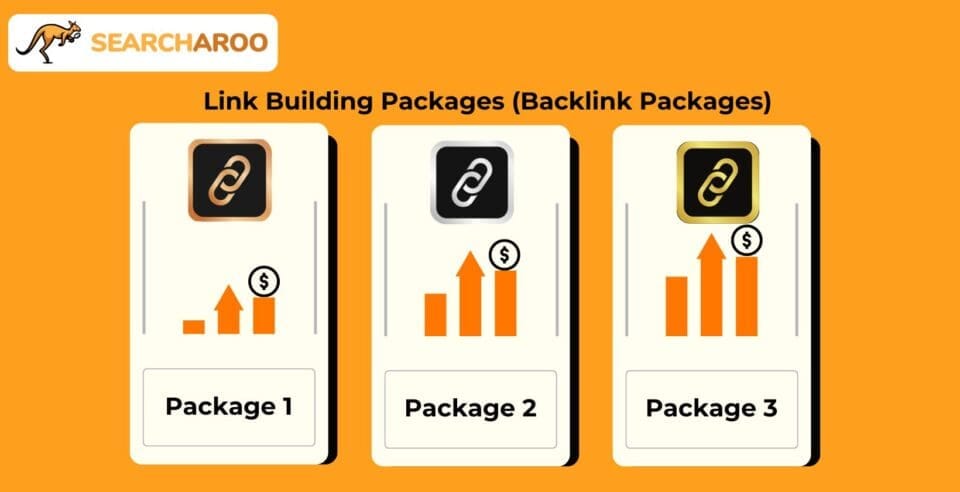Buy Backlink Packages (Link Building Packages)
Our link building packages offer a wide range of link metrics, quantity of backlinks and an overall discount when compared to individual link purchases.
Niche Edits Packages
Pack a punch with topically relevant niche edit links.
In-content links on existing topically relevant pages with existing history and power.
$550
BabyRoo Package
- 2x DR10+ Links
- 1x DR30+ Links
- 1x DR45+ Links
- No Duplicate Links*
- Do-Follow Links
- Pre-Approval of Links
- Link Transparency
Package 1
$1070
- 3x DR30+ Links
- 1x DR45+ Links
- 1x DR60+ Links
- No Duplicate Links*
- Do-Follow Links
- Pre-Approval of Links
- Link Transparency
Package 2
$1730
- 4x DR30+ Links
- 3x DR45+ Links
- 1x DR60+ Links
- No Duplicate Links*
- Do-Follow Links
- Pre-Approval of Links
- Link Transparency
Package 3
$3320
- 7x DR30+ Links
- 4x DR45+ Links
- 3x DR60+ Links
- No Duplicate Links*
- Do-Follow Links
- Pre-Approval of Links
- Link Transparency
- Anchor Text Analysis
Package 4
$5870
- 10x DR30+ Links
- 8x DR45+ Links
- 5x DR60+ Links
- No Duplicate Links*
- Do-Follow Links
- Pre-Approval of Links
- Link Transparency
- Anchor Text Analysis
Searcharoo provides affordable backlink options starting with our BabyRoo packages, which deliver quality links at entry-level pricing while maintaining the same high standards and guarantees as our larger packages for businesses with limited budgets.
All Prices in USD, Guaranteed live within 4 weeks
Provide us with a list of your current referring domains when uploading your information (the step after payment), and we will ensure no duplicate backlinks are built.
Upgrades are available at checkout, up to 2000 words per guest post.
Guest Posts Packages
Guest posts using freshly created relevant content on approved guest posting websites of your choice.
$570
BabyRoo Package
- 1x DR10+ Links
- 1x DR30+ Links
- 1x DR45+ Links
- No Duplicate Links*
- Do-Follow Links
- Pre-Approval of Links
- Link Transparency
Package 1
$1210
- 3x DR30+ Links
- 1x DR45+ Links
- 1x DR60+ Links
- No Duplicate Links*
- Do-Follow Links
- Pre-Approval of Links
- Link Transparency
Package 2
$1843
- 2x DR30+ Links
- 3x DR45+ Links
- 2x DR60+ Links
- No Duplicate Links*
- Do-Follow Links
- Pre-Approval of Links
- Link Transparency
Package 3
$2543
- 3x DR30+ Links
- 3x DR45+ Links
- 3x DR60+ Links
- No Duplicate Links*
- Do-Follow Links
- Pre-Approval of Links
- Link Transparency
- Anchor Text Analysis
Package 4
$4462
- 5x DR30+ Links
- 6x DR45+ Links
- 5x DR60+ Links
- No Duplicate Links*
- Do-Follow Links
- Pre-Approval of Links
- Link Transparency
- Anchor Text Analysis
All Prices in USD, Guaranteed live within 4 weeks
Express Delivery Available at Checkout – Get Your Order Delivered Faster
Our Link Building Customers
Buying Link Building Packages
Link building packages are extremely powerful for improving SEO performance. By offering a variety of backlinks from credible sources, these backlink packages increase domain authority and search engine rankings.

Monthly Backlink Packages (Recurring)
If you’re looking for monthly backlink packages, look no further! Our team offers a recurring link building service, which is ideal for those who want to plan ahead and allocate a monthly budget for link building.
Each monthly package comes with 1 additional FREE Link, making it very affordable link building.
Package 1
$1070
- 3x DR30+ Links
- 1x DR45+ Links
- 1x DR60+ Links
- 1x Additional FREE Links
- No Duplicate Links*
- Do-Follow Links
- Pre-Approval of Links
- Link Transparency
Package 2
$1730
- 4x DR30+ Links
- 3x DR45+ Links
- 1x DR60+ Links
- 1x Additional FREE Links
- No Duplicate Links*
- Do-Follow Links
- Pre-Approval of Links
- Link Transparency
Package 3
$3320
- 7x DR30+ Links
- 4x DR45+ Links
- 3x DR60+ Links
- 1x Additional FREE Links
- No Duplicate Links*
- Do-Follow Links
- Pre-Approval of Links
- Link Transparency
- Anchor Text Analysis
Package 4
$5870
- 10x DR30+ Links
- 8x DR45+ Links
- 5x DR60+ Links
- 1x Additional FREE Links
- No Duplicate Links*
- Do-Follow Links
- Pre-Approval of Links
- Link Transparency
- Anchor Text Analysis
Searcharoo enables customers to purchase backlinks in bulk through our larger package options, which provide substantial quantities of high-quality links with varying domain ratings that are delivered within our standard 4-week timeframe or through our express delivery option.All Prices in USD, Guaranteed live within 4 weeks
Provide us with a list of your current referring domains when uploading your information (the step after payment), and we will ensure no duplicate links are built.
Upgrades are available at checkout.
What are link building packages?
Backlink packages are bundled SEO services that combine multiple high-quality links from authoritative websites, which improve your website’s search engine rankings through increased domain authority while providing cost savings compared to individual link purchases. These packages deliver a collection of high-quality links at a discounted rate compared to purchasing individual backlinks, offering both convenience and cost efficiency for website owners seeking organic traffic growth.
When links are obtained from high-authority, relevant sites, link building packages can significantly enhance your site’s SEO performance. This approach builds trust and improves rankings on search engine result pages (SERPs).
What is included in a typical link building package?
A typical link building package includes a predetermined number of backlinks from guest posts, niche edits, and contextual links, along with services such as pre-approval of links, link transparency reports, and sometimes anchor text analysis. Searcharoo’s packages contain varying quantities of links with different domain rating (DR) metrics, ranging from DR10+ to DR60+, all delivered as dofollow links from relevant websites that pass authority to your domain.
How are link building packages delivered?
Link building packages from Searcharoo are delivered within a 4-week timeframe as guaranteed in their service terms, with links built gradually to mimic natural acquisition patterns. The delivery process includes pre-approval of all potential linking websites, transparent reporting on placement metrics, and confirmation when links go live, while an express delivery option is available at checkout for those requiring faster implementation.
Are link building packages effective for SEO?
When links are obtained from high-authority, relevant sites, link building packages can significantly enhance your site’s SEO performance. This approach builds trust and improves rankings on search engine result pages (SERPs).
Why Are Backlink Packages Important for SEO?
High-quality backlinks possess several key attributes including relevant domain authority (measured by metrics like DR), topical relevance to your website, placement on pages with genuine organic traffic, editorial content integration rather than footer or sidebar placement, and dofollow status that passes link equity to your site.
Backlink packages are vital for improving your site’s search engine visibility and overall ranking. Backlinks from authoritative websites signal to search engines that your content is trustworthy and credible, making it more likely to appear higher in search results.
Why are backlink packages Important for SEO?
Backlink packages are vital for improving your site’s search engine visibility and overall ranking. Backlinks from authoritative websites signal to search engines that your content is trustworthy and credible, making it more likely to appear higher in search results.
Why do backlinks matter?
Backlinks act as “votes” for your website, indicating its relevance and quality. High-quality backlinks from authoritative sites increase your chances of ranking higher in search engine results.
Do backlinks still influence search engine rankings?
Yes, backlinks remain one of the top ranking factors for search engines. Quality backlinks help establish trust and relevance, which are key elements for search engine algorithms.
How long does it take to see results from backlinks?
Backlink results typically become visible within 3 to 6 months after implementation, with initial ranking improvements appearing gradually as search engines discover and evaluate the new links. The timeline for significant changes varies based on your industry’s competitiveness, your website’s current authority, and the quality of backlinks acquired, with more competitive niches potentially requiring longer periods before substantial ranking improvements materialize.
How to Choose the Right Link Building Package
Selecting the right link building package depends on your business needs, industry, and budget. The key factors to consider are the quality of the websites offering backlinks, the number of backlinks included, and the relevance of the content.
Searcharoo offers a straightforward process for buying quality backlinks that begins with selecting your preferred package type (niche edits or guest posts), choosing the package size that fits your budget, and completing your purchase through our secure checkout system where you can provide your target URLs and keywords.
What factors should I consider when choosing a link building package?
Consider the domain authority of the websites, the relevance to your industry, and the number of links offered. Packages should be customized to target keywords or audience segments that are important for your business.
What is the difference between lower link building packages and higher costing link building packages?
The lower costing link building packages typically have lower quality metrics on the links provided and/or less links provided within the package. Link building packages are delivered over time to ensure natural growth. The links are built gradually, avoiding any sudden increase that could trigger penalties from search engines.
Should I opt for a one-time package or a monthly service?
For sustained growth, a monthly link building package is recommended as it delivers links over time, mimicking organic growth, it is also cheaper for you. One-time packages might offer a quick boost but may not provide the long-term benefits.
Link building packages are bundled services designed to improve your website’s search engine rankings by providing backlinks from authoritative websites. These backlinks help boost your domain authority, driving more organic traffic.
When links are obtained from high-authority, relevant sites, link building packages can significantly enhance your site’s SEO performance. This approach builds trust and improves rankings on search engine result pages (SERPs).
Are Link Building Packages Suitable for All Types of Websites?
Yes, link building packages would be beneficial for most websites, but the approach may vary depending on the site’s size, niche, and audience. Some websites require more backlinks then other websites.

Is link building effective for new websites?
Yes, even new websites benefit from acquiring backlinks, as it helps build domain authority and increase visibility. But we would advise on talking to your dedicated account manager first to ensure we come up with the right backlink strategy for your website.
Does link building work for e-commerce or local businesses?
Absolutely. E-commerce sites benefit from niche-related backlinks, while local businesses gain from links on locally relevant websites.
What Results Can I Expect from a Backlink Package?
Results depend on several factors, including the number and quality of SEO backlinks, as well as your industry’s competitiveness.
How soon can I expect results?
Typically, improvements in rankings are noticeable within 3 to 6 months, though larger or more competitive markets may take longer.
Are Link Building Packages Safe for My Website?
Link building packages from Searcharoo are safe for your website when implemented through their ethical white-hat methodology, which focuses on quality over quantity and natural link profiles.
The company maintains safety by avoiding spammy tactics, ensuring topical relevance between linking sites, and following strict guidelines that have prevented any customer penalties since 2018, though they acknowledge that all link building carries inherent risks that they actively work to mitigate.
Can link building hurt my website?
Low-quality or spammy link building can harm your website, but Searcharoo follows strict guidelines and link building practices to try and prevent this from happening to our customers. To date we have never had a customer receive a penalty and we have been in the business since 2018.
How Much Do Link Building Packages Cost?
The cost of link building packages varies by factors like backlink quality and the authority of the websites linked to.
What is the price range for Searcharoo’s link building packages?
Prices range from 300 € ($320, £260) for basic packages to 3,000 € ($3,210, £2,600) for premium options.
Do You Offer Any Other SEO Services Alongside Link Building?
Yes, Searcharoo provides a range of complementary SEO services that enhance your link building strategy.
What additional services can I purchase?
Searcharoo offers complementary SEO services including keyword research, content marketing, and technical SEO audits alongside your link building package, which work together to create a comprehensive optimization strategy that maximizes the effectiveness of your backlinks.
How Long Does It Take for Link Building Packages to Show Results?
SEO results from link building are not immediate and typically take a few months to materialize.
How quickly will I see results from link building?
Most clients notice improvements within 3 to 6 months, depending on the competitiveness of the industry and the package size.
Can I Track the Progress of My Link Building Campaign?
Tracking the progress of your link building is key to ensuring its effectiveness.
How can I monitor my campaign?
Searcharoo provides detailed reports on backlink placements and keyword ranking improvements.
Are Link Building Packages a One-Time or Ongoing Investment?
Link building works best as an ongoing effort to maintain and improve rankings.
Should I buy a one-time package or subscribe to a monthly plan?
A monthly plan ensures consistent backlink growth, while a one-time package can boost your SEO for specific campaigns.
Are There Any Risks Associated with Link Building?
There are risks with low-quality link building, but Searcharoo’s ethical practices minimize any potential harm.
How does Searcharoo keep link building safe?
We only use white-hat, manual outreach methods to secure high-quality, relevant dofollow backlinks, avoiding risky practices like buying links from low-quality sources.
How Does Searcharoo Stand Out in the Market?
Searcharoo’s high-quality, tailored approach to link building sets us apart from competitors.
What makes Searcharoo different?
Searcharoo’s link building packages stand apart through their transparent metrics, pre-approval of all links before placement, guaranteed dofollow status, and comprehensive replacement guarantee within a 6-month period. The company’s approach focuses on niche-specific link building strategies with strict quality control measures, which have resulted in zero penalties for customers since the company’s founding in 2018, demonstrating their commitment to ethical and effective SEO practices.
Searcharoo’s link building packages are designed to meet the specific needs of your business, whether you’re looking for a one-time SEO boost or long-term growth. Our packages, combined with our other SEO services, provide a comprehensive strategy for improving your rankings, driving organic traffic, and establishing authority in your industry.
Frequently Asked Questions About Searcharoo’s Link Building Packages
1. How Do You Select Websites for Backlinks?
At Searcharoo we focus on niche relevance and site authority when selecting where to place backlinks. Your dedicated account manager will help you find the best possible links for your website.
What criteria do you use to select websites?
Searcharoo selects websites for backlinks through a comprehensive evaluation process that examines each site’s relevance to your specific industry, domain authority metrics (particularly Domain Rating), organic traffic patterns, and content quality. Your dedicated account manager personally reviews potential linking websites to ensure they meet these criteria while avoiding sites with spammy content or questionable link profiles that could potentially harm your SEO efforts.
2. Will the Links Be Permanent?
Most backlinks are permanent, though some rare exceptions may occur.
Are Searcharoo’s backlinks permanent?
Searcharoo’s backlinks are designed to remain permanently on the host websites, creating lasting value for your SEO strategy. In the rare instance when a link is removed by the host website, Searcharoo provides free replacement links within their 6-month guarantee period, ensuring your investment maintains its value and continues supporting your website’s authority growth over time.
Are the links dofollow or nofollow?
Yes. All links we place will be dofollow. If they aren’t we will replace them for free.
3. What Industries Do You Specialize In?
Searcharoo caters to a wide range of industries, with specialization in high-competition sectors like finance, technology, and e-commerce.
4. Can Link Building Help with Local SEO?
Yes, local businesses benefit greatly from backlinks that are relevant to their geographic area.
5. Can I Combine Link Building with Content Marketing?
Combining content marketing with link building amplifies both strategies, resulting in better SEO outcomes.
6. Can I Target Specific Keywords with Link Building?
Yes, we align anchor texts with your target keywords to ensure maximum relevance and SEO impact.
7. Can I Get a Free Consultation Before Buying a Link Building Package?
Yes, Searcharoo offers a free consultation to help assess your needs and recommend the best package for your goals.
Our Link Building Clients Testimonials
Check what people are saying about our link building packages.
★★★★★
Great company. I have used so many high profile names to get links but honestly they are all bluster. These guys are the real deal. Quality link building packages. I’ve seen over 100% YOY growth.

Brian McDaid
Local Business Owner, USA
★★★★★
Excellent link building service, highly recommended. Ana is always available to promptly answer any queries and is always willing to provide recommendations when asked to do so.

Karim Salama
Digital Agency Owner, UK
★★★★★
Searcharoo services have me scale my clients businesses, and allowed me to increase the value i can offer as part of my service. They offer great link building packages.

Jack Purdie
ADVRT Southampton, Agency UK
★★★★★
Amazing link building service, super easy to use and easy monthly payments, so your staff can handle it all.

Mad Singers
SEO, Business Mentor & Success Coach
Looking for other link building options?
Building links on scale in any niche can be a tough and time-intensive task. But with the help of our awesome outreach team, they will do all the hard work for you.
Guest Posts
Brand new blog posts on real websites. 500+ words of professionally written content containing your Dofollow link.
Link Packages
If you’re looking for a mix of link quantity and power, Link Packages are what you
need.
Niche Edits
Boosting website authority through strategic edits within existing content on niche-relevant sites.
Searcharoo accommodates link building for any niche through our large inventory of contacts that we’ve built relationships with over the past 3 years, allowing customers to purchase backlinks specifically tailored to their website’s industry or topic focus.
Pre-approve all links before they go live. We operate on full transparency at Searcharoo by showing you the links we find for you. You have the option to go ahead with the link, or we will find you a replacement. Free of charge.
If you have a website and you want to grow your organic traffic, look no further. We have 4 options for you, based on DR (domain rating). We recommend a regular mix of high DR links for more competitive niches.
*Provide us with a list of your current referring domains when uploading your information (the step after payment), and we will ensure no duplicate links are built.